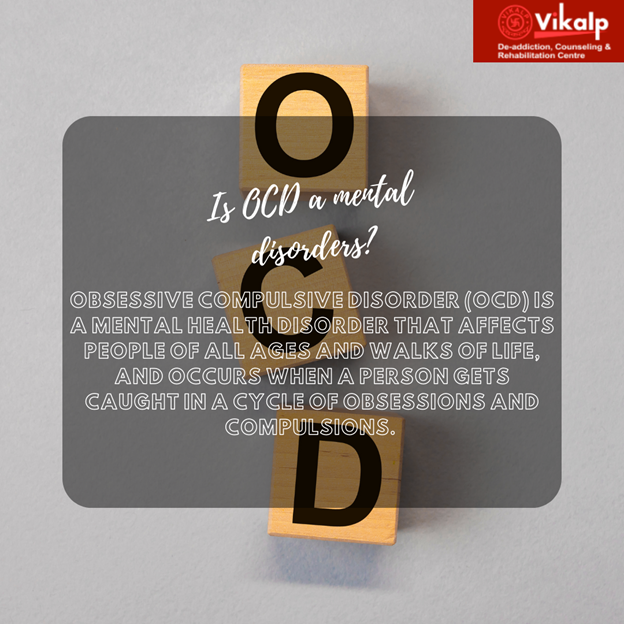What is Obsessive Compulsive Disorder (OCD)?
Obsessive Compulsive Disorder (OCD) is a chronic mental health condition that affects millions of people worldwide. It is characterized by intrusive, repetitive, and distressing thoughts (obsessions) and the urge to perform repetitive behaviors or rituals (compulsions). OCD can significantly impair a person’s daily life, causing distress and anxiety. Understanding the causes, symptoms, and treatment options for OCD is crucial in providing effective support and intervention for individuals grappling with this disorder.
Moreover, we have a rehabilitation centre in Delhi, named Vikalp Rehab. We offer the best treatment for OCD as we have the best clinical psychologist. Vikalp Rehab also helps people to gain knowledge about different mental illnesses and addiction. Let us now discuss the causes and symptoms of OCD.
Causes of OCD
The exact cause of OCD remains unclear, but researchers believe that a combination of genetic, neurological, and environmental factors play a role in its development. Some studies suggest a genetic predisposition, as individuals with a family history of OCD have a higher risk of developing the disorder. Additionally, abnormalities in certain brain areas and neurotransmitter imbalances, particularly involving serotonin, have been linked to OCD. Traumatic life events, such as abuse or loss, may also trigger or exacerbate OCD symptoms in some individuals.
In addition to genetic, neurological, and environmental factors, research has also explored the role of certain personality traits in contributing to OCD. Obsessive-Compulsive Personality Disorder (OCPD) is a separate but related condition characterized by perfectionism, rigidity, and an overwhelming need for order and control. While OCPD is distinct from OCD, some studies have found a higher prevalence of OCD symptoms in individuals with OCPD traits. This suggests that certain personality characteristics may interact with other factors to influence the development of OCD. Further research is needed to fully understand the interplay between genetics, neurobiology, environment, and personality factors in the manifestation of OCD.
Symptoms of OCD
OCD manifests through a range of distressing obsessions and compulsions. Obsessions are intrusive and unwanted thoughts, images, or urges that cause immense anxiety. Common obsessions include fear of contamination, concerns about harm coming to oneself or others, and the need for symmetry or exactness. Compulsions, on the other hand, are repetitive behaviors or mental acts that individuals engage in to reduce the distress caused by their obsessions temporarily. These compulsive behaviors often feel obligatory and become time-consuming, significantly interfering with daily functioning.
Common OCD disorder symptoms include repetitive hand-washing, checking and rechecking locks, counting compulsions, constant seeking of reassurance, and repeating rituals until they feel “just right.” Additionally, individuals may have distressing, unwanted thoughts that go against their values or beliefs, leading to intense guilt and shame.
Treatment of OCD
OCD is a treatable condition, and several therapeutic approaches have proven effective in managing its symptoms.
- Cognitive Behavioral Therapy (CBT): CBT is the primary form of psychotherapy used to treat OCD. It involves identifying and challenging irrational thoughts and beliefs associated with compulsions and obsessions. Through exposure and response prevention (ERP), individuals gradually face their fears and learn healthier ways to cope with anxiety.
- Medication: Serotonin reuptake inhibitors (SRIs) are commonly prescribed antidepressants that can help alleviate OCD symptoms. They work by affecting serotonin levels in the brain, reducing the severity of obsessions and compulsions.
- Mindfulness and Relaxation Techniques: Techniques such as mindfulness meditation and deep breathing can aid in reducing anxiety and managing obsessive thoughts.
- Support Groups: Joining support groups allows individuals with OCD to connect with others who share similar experiences, providing a sense of understanding and belonging.
- Family Therapy: Involving family members in therapy can enhance the support system and improve communication within the family.
- Self-Help Strategies: Developing coping mechanisms and self-help strategies can empower individuals to manage OCD symptoms in their daily lives.
Seeking Help for OCD
Recognizing the signs of OCD and seeking help is crucial for individuals and their loved ones. If OCD symptoms interfere with daily activities, relationships, or cause significant distress, it is essential to consult a mental health professional. Early intervention and appropriate treatment can lead to significant improvements in the quality of life for individuals living with OCD.
Final Thoughts
OCD is a complex mental health disorder characterized by intrusive thoughts and compulsive behaviors. Its origins involve a combination of genetic, neurological, and environmental factors. Recognizing the symptoms of OCD is vital in providing appropriate support and treatment. With effective therapeutic interventions such as CBT and medication, individuals can manage OCD symptoms and lead fulfilling lives. If you or someone you know is struggling with OCD, reach out to a mental health professional for guidance and support on the journey to recovery.
If you or your loved ones are struggling with OCD, join Vikalp Rehab for the treatment. You can contact us at any time and we stay available for help 24*7. Our psychologists will help you find the best treatment for you which will entirely suit you. It is never too late to ask for help.
741 total views, 6 views today

